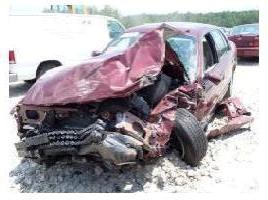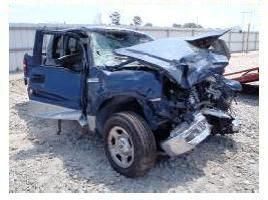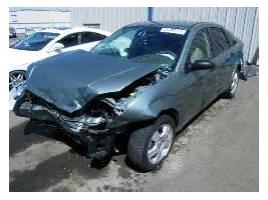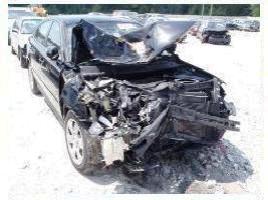Ask an Attorney a Question for FREE!
Rental Car Coverage
Page 2

Your rental car coverage will not pay for a substitute vehicle until the bodyshop has your car in their garage AND has the necessary parts on hand to start working.
If the necessary parts take a long time to arrive (from China, Japan, Taiwan, or the closest salvage yard), then you will be driving your wrecked vehicle around town!
Insurance companies also limit the amount of time you can have the rental car.
They will try to terminate your coverage as soon as the law allows them to.
The termination of the rental car usually occurs when the insurance company determines your repairs are done, even if the repairs are not considered final (if you have to come back for further work).
In addition to this, you must pick up your vehicle the day the vehicle’s repairs are done and drop off your rental that same day.
It gets worse in a total loss situation. In most jurisdictions, if the car is a total loss, you must get out of the rental car three days after the payment is issued (insurance companies usually issue two payments).
Texas allows for one day! That is it, only one day after they tell you that the car is a total loss.
The first payment they issue is upon deeming a vehicle a total loss and a second payment once they have the actual title on hand.

Most statutes only allow for “three days after the first payment is issued.” This means that jurisdictions do not allow for mailing time.
By the time you get the check, you probably have to get out of a rental car. It makes finding a replacement vehicle difficult.
Montana is one of the few states that start the countdown for rental car coverage three days after you RECEIVE the check.
I think this is very unfair, three days (sometimes less) to find a vehicle is simply not enough.
The fact that the value is under protest or in dispute does not matter. Rental car coverage will end three days after the insurance carrier issues payment.
Check your state legislation to determine how many days of rental coverage you have and if they owe you those days after the vehicle is totaled or after you receive payment for your damages.
If you are in this situation, request (demand) that they “overnight” the check to you (this will get you about two days to get a car).
If you do not have a physical address where this is possible, then have the insurance company overnight the check to your agent’s office.
Also, have your agent call you once the check is in so you can pick it up and take it to the bank!
If this is not possible then have one of the local claim's offices give you a check (the claims office is not your agent’s office).

If this is not possible, then have the field representative or the people that inspected your car (if it was an employee of the insurance company) give you a field check (a handwritten check from the insurance company).
In a situation of a car loan, it can get even messier.
Most insurance companies will make you prove that you have an actual loss of use.
Therefore, if you have an extra car, they will ask you, why don’t you drive that?
Sometimes it is not a big deal, and you can drive that other vehicle, but you will forfeit your loss of use claim (you had an extra car, so there was nothing that you missed out on, therefore there was no actual damage to you).
What usually is the case is that people want to be paid the rental car coverage directly and then try to figure out some other transportation arrangements afterward (husband drops wife off at the office and picks her up after work, public transportation, bicycle, motorcycle, etc.).
The adjuster will not just pay the limits of $25 per day. They would negotiate a cheaper rate so they can save some money. Most likely they would pay $20 or close to it.
This seem fair to me, you have to adjust your lifestyle (sometimes a big pain in the neck).
You can get your rental car coverage and at the same time the insurance company is saving a few bucks (a win – win scenario).
Many insurance companies (Allstate is one of them) have realized that they can save even more at your expense, and they have capitalized in this business venture quickly.

They have language under the rental car coverage section where if you do not rent a vehicle, the maximum they will pay you (in other words, if you have a valid loss of use claim but no extra vehicle available to you) is $10 per day or less (even if you have $60 per day limits).
This coverage does come in handy when your vehicle is at the bodyshop, but be aware that even if you have high limits ($100 per day), you could end up having to pay a bunch of fees and charges (mileage, gas, tax, extra insurance, etc.).
Rental Coverage page 1Click below for an explanation insurance coverages and terms:
Automobile Liability Insurance or Liability Page 1
Automobile Liability Insurance or Liability Page 2
Automobile Medical Payments or Personal Injury Protection (PIP) Page 1
Automobile Medical Payments or Personal Injury Protection (PIP) Page 2
Collision Coverage (Protection Against Loss to the Auto) Page 1
Collision Coverage (Protection Against Loss to the Auto) Page 2
Comprehensive Coverage (Protection Against Loss to the Auto) Page 1
Comprehensive Coverage (Protection Against Loss to the Auto) Page 2
Under or Uninsured Motorist Property Damage (UMPD) Page 1
Under or Uninsured Motorist Property Damage (UMPD) Page 2
Under or Uninsured Motorist Bodily Injury (UMBI)
Rental Reimbursement or Loss of Use Coverage Page 1
Rental Reimbursement or Loss of Use Coverage Page 2
Restoration Coverage
Towing and/or Road Assistance Coverage (Emergency Packages)
Insurance Clauses and Terms
Overview
Actual Cash Value or ACV
Additional Insurance Clause
Cancellation of Coverage Clause
Choice of Law Clause
Forum Selection Clause
Duty to Cooperate Clause
Duty to Report Losses Clause
Financial Responsibility Clause
Insurable Interest Concept
Interpretation of the Policy Concept
Mandatory Arbitration Clause
Mitigation of Damages Clause
Non Duplication of Benefits Clause
Proof of Loss Clause
Promissory Estoppel Concept
Reservation of Rights Concept
Reasonable and Necessary Clause
Right of Appraisal Clause
Right of Settlement Clause
Rights of Counsel Concept
Subrogation of Rights Clause Part I
Subrogation of Rights Clause Part II
Statute of Limitations Concept
Replacement Cost Value
Restoration Coverage
Transfer of Benefits Clause
|
For a Free Review of Your Case
Please Call (866) 878-2432 |


